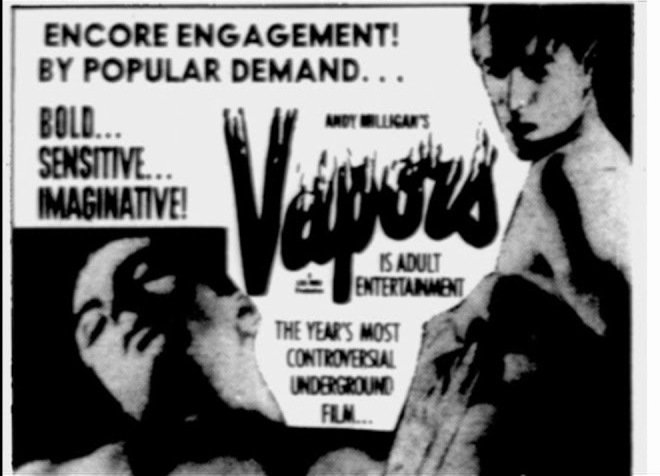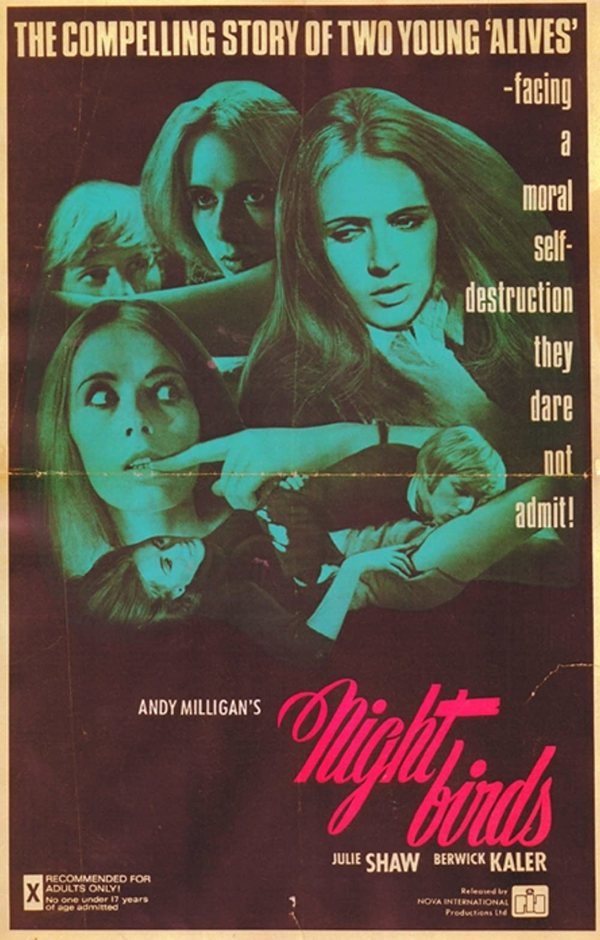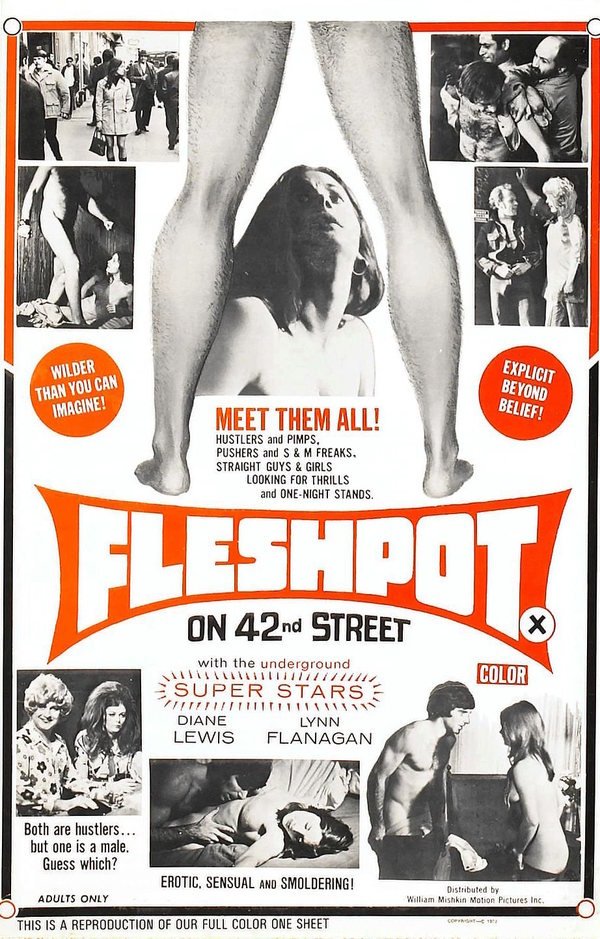MILLIGANMANIA! Part 3: A Secret Auteur Stalks The Grindhouse
A frequent accusation aimed at Andy Milligan is that his work is artless: indifferently shot and edited, erratically performed, riddled with anachronisms and technical gaffes and too rushed to be the work of a seriously intentioned filmmaker. However, if you can get past the rushed, rough technical qualities of his films, even his most commercially minded productions reflect a particular world view and set of narrative and thematic obsessions.Even more impressive are a series of films divorced from the usual horror or roughie formats that show Milligan could have had a different sort of career with the right luck and encouragement. The third installment of Milliganmania assembles a triple bill that represents Milligan as auteur: someone who could explore and comment on the forgotten men and women carving out a life at the edge of the city. People who would be ignored by most of polite society become the focus in these films and he finds a gritty poetry in their usually tragic lives. VAPORS: Milligan made this short film around 1965 and it became something of a sensation on the underground circuit, even getting bootlegged and making it out to the West Coast. It tells the tale of a young man (Gerald Jacuzzo) meeting a repressed older man (Robert Dahdah) enjoying a night's escape from a dead-end marriage at a gay bathhouse. These ships passing in the night make a connection, revealing a surprising amount about themselves, but such fast-moving events are seldom made to last. Milligan's skill with the camera is raw but his habit of staying up-close to his actors serves him well here: the two leads give complex, textured performances that hold up nicely to this sort of scrutiny. It also has an impressive sense of tempo and narrative ambition for a dialogue-driven piece, weaving in a trio of queens (including Milligan regular Hal Borske) who camp about and act like a Greek chorus. It builds to an ending that is is both heartbreaking and realistic, showing Milligan's off-Broadway training had given him a skill for gritty drama. Important trivia note: the perceptive script was written by Hope Stansbury, who as an actor would become a vital part of Milligan's repertory company.
VAPORS: Milligan made this short film around 1965 and it became something of a sensation on the underground circuit, even getting bootlegged and making it out to the West Coast. It tells the tale of a young man (Gerald Jacuzzo) meeting a repressed older man (Robert Dahdah) enjoying a night's escape from a dead-end marriage at a gay bathhouse. These ships passing in the night make a connection, revealing a surprising amount about themselves, but such fast-moving events are seldom made to last. Milligan's skill with the camera is raw but his habit of staying up-close to his actors serves him well here: the two leads give complex, textured performances that hold up nicely to this sort of scrutiny. It also has an impressive sense of tempo and narrative ambition for a dialogue-driven piece, weaving in a trio of queens (including Milligan regular Hal Borske) who camp about and act like a Greek chorus. It builds to an ending that is is both heartbreaking and realistic, showing Milligan's off-Broadway training had given him a skill for gritty drama. Important trivia note: the perceptive script was written by Hope Stansbury, who as an actor would become a vital part of Milligan's repertory company. NIGHTBIRDS: this was the only one of Milligan's English films to avoid horror trappings and the result is one of his strongest all-around films. It places the viewer up close to watch the abbreviated life cycle of a gutter romance: it starts when a young woman (Julie Shaw) picks up a young man (Berwick Kaler) who's just been kicked out on the streets and brings him home to her coldwater flat. They quickly fall for each other but she becomes unpredictable, domineering and ultimately cruel, with some shock eleventh-hour revelations about her life setting up a bitter pill of a finale. Milligan was left to his own devices for once here and he brings both insight and pitiless honesty about life at society's margins to his work. He's more careful than usual with camerawork, structure and pacing and gets impressive, melodrama-free performances from Shaw and Kaler that sell the film's thorny take on the self-destructive potential of romance. If you showed this to someone who didn't know about Milligan's work, they'd simply assume it was a lost gem of U.K. underground filmmaking.
NIGHTBIRDS: this was the only one of Milligan's English films to avoid horror trappings and the result is one of his strongest all-around films. It places the viewer up close to watch the abbreviated life cycle of a gutter romance: it starts when a young woman (Julie Shaw) picks up a young man (Berwick Kaler) who's just been kicked out on the streets and brings him home to her coldwater flat. They quickly fall for each other but she becomes unpredictable, domineering and ultimately cruel, with some shock eleventh-hour revelations about her life setting up a bitter pill of a finale. Milligan was left to his own devices for once here and he brings both insight and pitiless honesty about life at society's margins to his work. He's more careful than usual with camerawork, structure and pacing and gets impressive, melodrama-free performances from Shaw and Kaler that sell the film's thorny take on the self-destructive potential of romance. If you showed this to someone who didn't know about Milligan's work, they'd simply assume it was a lost gem of U.K. underground filmmaking. FLESHPOT ON 42ND STREET: this was ostensibly made for the sexploitation market - indeed, it was available in both softcore and hardcore versions - but it's a perfect companion piece to Nightbirds as it is also a tragic love story that plays out against a squalid big city backdrop. The heroine is Dusty (Laura Cannon), a street prostitute who moves from one scam to the next until she manages to find an unorthodox but real romantic relationship with businessman Bob (Harry Reems). However, the streets may not be done with Dusty just yet and fate can have unexpected turns. Milligan is firing on all cylinders here, creating a darkly hued, convincing portrait of the hustler's life populated with vivid characters and dialogue. His rough-hewn technical style suits the coarse settings beautifully - and he gets strong, complex performances from Cannon and Reems, who both respond to material that allows them to act outside the bedroom. Also worthy of note here is Neil Flanagan, who plays the heroine's transvestite prostitute roommate/partner-in-crime: he shows an impressive skill for both bawdy comedy and searing drama. The film is powerful from its first moments to a finale that knocks the wind out of you - and it's a strange, beautiful irony that the only lyrical lovemaking scenes that Milligan shot for one of his films were hardcore in nature.
FLESHPOT ON 42ND STREET: this was ostensibly made for the sexploitation market - indeed, it was available in both softcore and hardcore versions - but it's a perfect companion piece to Nightbirds as it is also a tragic love story that plays out against a squalid big city backdrop. The heroine is Dusty (Laura Cannon), a street prostitute who moves from one scam to the next until she manages to find an unorthodox but real romantic relationship with businessman Bob (Harry Reems). However, the streets may not be done with Dusty just yet and fate can have unexpected turns. Milligan is firing on all cylinders here, creating a darkly hued, convincing portrait of the hustler's life populated with vivid characters and dialogue. His rough-hewn technical style suits the coarse settings beautifully - and he gets strong, complex performances from Cannon and Reems, who both respond to material that allows them to act outside the bedroom. Also worthy of note here is Neil Flanagan, who plays the heroine's transvestite prostitute roommate/partner-in-crime: he shows an impressive skill for both bawdy comedy and searing drama. The film is powerful from its first moments to a finale that knocks the wind out of you - and it's a strange, beautiful irony that the only lyrical lovemaking scenes that Milligan shot for one of his films were hardcore in nature.


